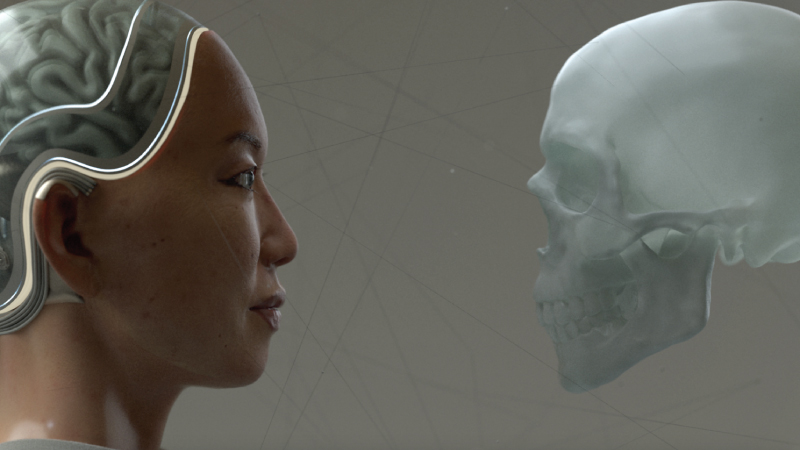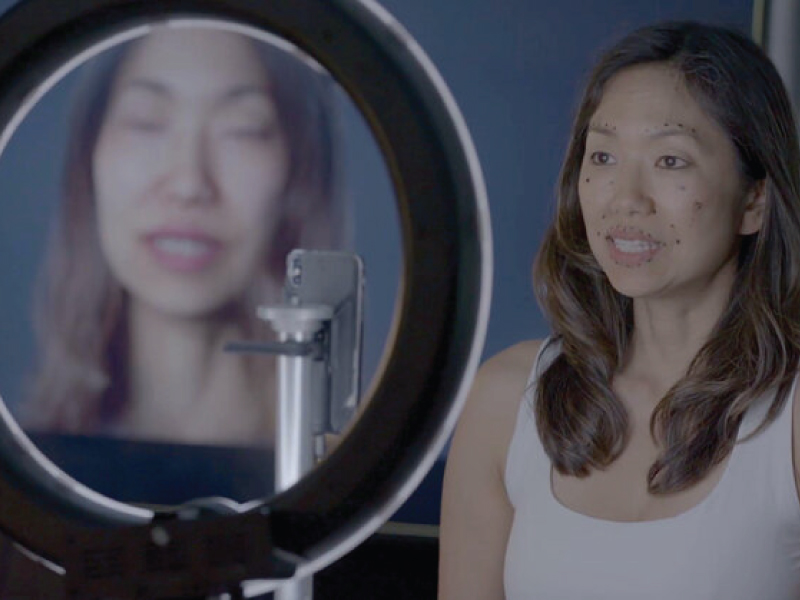Exploring the possibilities of AI clones to extend human life

Ann Shin’s avatar in the poster image for Hot Docs’ opening night documentary film selection A.rtificial I.mmortality
All film images courtesy of Fathom Film Group
What if you could live forever? A.rtificial I.mmortality (external link, opens in new window) , a new documentary by Canadian Director Ann Shin, which opened the Hot Docs Canadian International Documentary Festival this year, explores the possibilities of artificial intelligence (AI) in a ‘post-biological’ world and features the pioneering work of academic entrepreneur and RTA professor Hossein Rahnama.
Not only can [AI] extend human life, but it can make us immortal.
The film highlights Rahnama’s Augmented Eternity Project (external link, opens in new window) , a platform offering the possibility of life after death. The program can encode an individual’s knowledge and memories as a ‘mind file’ which is then uploaded to a digital avatar that can interact with people based on this data. “Not only can [AI] extend human life,” says Rahnama, associate professor, RTA School of Media, MIT Media Lab visiting professor, co-founder Ryerson DMZ (opens in new window) and founder of Flybits (external link, opens in new window) , “but it can make us immortal.”

Dr. Hossein Rahnama, Associate Professor, RTA School of Media and Visiting Professor at MIT Media Lab
The possibilities of AI-facilitated intergenerational collective intelligence
A new model of the internet in which expertise is decentralized is what informs Rahnama’s work in AI today. “Much of my early work focused on feeding data into the machine to decide what's relevant and I saw a lot of bias,” says Rahnama about the origins of his project. “Rather than relying on a machine or platforms like Google or Facebook, I thought why don't we decentralize the internet as a way to start learning from eachother and lending eachother our expertise. We built algorithmic capabilities to demonstrate how this could become a platform and this is where the notion of augmented eternity comes in.”
A unique aspect of Rahnama’s work is the development of AI capability that mimics not only the logical brain but emotions and affect. The result is a digital proxy that captures feelings as well as thoughts and makes them accessible to future generations through the interface of an avatar.

Filmmaker Ann Shin has her digital avatar created
In the film, Rahnama, with his collaborators, creates a neural network algorithm of Ann Shin giving audiences a glimpse of the AI system at work as it reads and quantifies emotion from personal photographs shared by the filmmaker. Rahnama partnered with Pixomondo (external link, opens in new window) which, using 360° camera technology, created a digital clone of Anne.
A similar digital avatar of prolific author and personal transformation guru Deepak Chopra is also featured in the film. Created by the AI Foundation, ‘Digital Deepak’ is also informed by the objectives of knowledge preservation and sharing.
Millennials are generating gigabytes of data on a daily basis... If we give them control and ownership, and still have an opportunity to learn from this data based on their consent, they can create shareable expertise.
Personal data as personal asset
With the ubiquitous mining and selling of personal data by big technology companies, including our most treasured memories in the form of personal photos and messages posted online, Rahnama is seeking greater personal control over our data.
“Millennials are generating gigabytes of data on a daily basis and in most cases, they don't own or control the use of this data, he says. “If we give them control and ownership, and still have an opportunity to learn from this data based on their consent, they can create shareable expertise.”
Young people today are creating massive digital footprints, data that in many cases is being siloed and used for things like targeted ads. Rahnama believes in taking AI out of the hands of the usual power brokers as a way to protect our personal information and data, but which also allows us to use it to our own advantage, whether it’s to preserve and share knowledge and expertise, or as an asset that can be invested.
Regulating AI technologies and reducing bias through design
Rahnama believes exploring AI means more than imagining its technical or algorithmic possibilities, but also involves ethical and design perspectives so that AI can become a tool to help rather than harm. With recent controversies surrounding the built-in biases of AI like surveillance technologies that misidentify dark-skinned people or high stakes of autonomous weapons development, Rahanam says it is essential to understand the basis of how an AI tool comes to a decision.
“There is a need for auditability around a decision, recommendation or suggestion to prevent algorithm bias,” says Rahnama. “We have seen biases around race that have shown a need for regulation, guidelines, education and best practices, not just for AI, but also for data because AI and data go hand in hand.”
Rahnama believes this is where FCAD can shine, “For example, the way you build user interfaces, he says. “The way you think about the next generation of AI-driven user experience is very different from the static user interfaces we’re used to. You need to build for that dynamic adaptive, sensitive, predictive interface and FCAD can shine there.”
To find out when A.rtificial I.mmortality will screen next, follow on social media (external link, opens in new window) .

FCAD at Ryerson University
Entering its eighth decade, FCAD is a global centre of media and creative invention. As a disrupter in innovative education, FCAD is dedicated to developing creators with authentic voices who engage directly with creative industries around the world.
With 23 undergraduate and graduate programs that are shaping the future of their fields and tight-knit partnerships around the world, FCAD offers more opportunities to educate the next generation of creative leaders than anywhere else.
